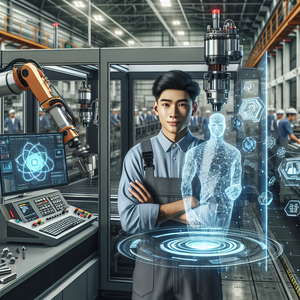
CNC Careers in 2025: Navigating Automation, AI, and Opportunities in Manufacturing
As 2025 unfolds, the CNC (Computer Numerical Control) machining and manufacturing industry stands at a pivotal moment. Long valued for its precision and efficiency, the sector is now navigating a wave of transformative change driven by advancements in automation, artificial intelligence (AI), and robotics. With industries like aerospace, electronics, and semiconductors leading the charge, demand for skilled professionals has risen sharply. However, the fast pace of change also brings unique challenges, including the need to address stagnant wages, fears of job displacement due to automation, and an ever-growing skills gap.
Job Summaries:
CNC Machinist:
- CNC machinists operate and maintain CNC machines to produce intricate parts and tools.
- Key skills include blueprint reading, machine programming, and quality inspection.
- Certifications like NIMS provide an advantage.
- While automation has streamlined tasks, industries like aerospace and semiconductors create niche opportunities requiring ultra-precise work.
Tool and Die Maker:
- Tool and die makers design and build tools, molds, and dies for mass production.
- This role demands CNC machinery expertise, precision measurement skills, and technical drawing interpretation.
- While automation enhances efficiency, custom designs and prototypes ensure the role's stability and importance.
CNC Programmer:
- CNC programmers create G-code instructions for CNC equipment.
- They require CAD/CAM software mastery and manufacturing process knowledge.
- AI and machine learning are influencing programming.
- Professionals are essential for troubleshooting and optimizing workflows.
Quality Control Inspector:
- QC inspectors ensure manufactured components meet industry standards using precision tools.
- As automation grows, they oversee AI-driven inspection systems and validate results, combining human expertise with advanced technology.
CNC Maintenance Technician:
- Maintenance technicians diagnose and repair CNC machinery, requiring skills in mechanical systems and IoT-enabled technology.
- The role is evolving with smart manufacturing, emphasizing advanced diagnostics and data analytics.
Automation Specialist:
- Automation specialists design robotic systems to enhance manufacturing processes.
- Blending robotics, mechanical engineering, and IoT integration.
- They drive efficiency and cost reductions.
- Playing a pivotal role in CNC production.
CNC Sales Engineer:
- CNC sales engineers combine technical expertise with client interaction.
- They identify solutions, provide demonstrations, and offer support.
- Their role is vital as CNC systems grow more complex.
- They require clear communication of advanced equipment's value.
CNC Trainer/Instructor:
- CNC trainers prepare machinists and programmers by creating training materials and providing hands-on instruction.
- They address the growing skills gap, equipping workers to thrive in automated environments.
AI Integration Specialist:
- AI integration specialists implement AI solutions in CNC manufacturing, focusing on predictive maintenance, process optimization, and analytics.
- This emerging role combines computer science with manufacturing expertise to enhance efficiency.
The CNC machining industry in 2025 offers a wealth of opportunities for those willing to adapt and stay ahead of technological trends. Whether you’re an aspiring machinist, a seasoned programmer, or someone interested in automation, the key to success lies in upskilling and staying informed about the latest developments in manufacturing technology.
Explore More Jobs

